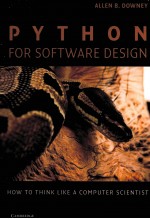图书介绍
PYTHON FOR SOFTWARE DESIGN HOW TO THINK LIKE A COMPUTER SCIENTISTPDF|Epub|txt|kindle电子书版本网盘下载

- ALLEN B.DOWNEY 著
- 出版社: CAMBRIDGE UNIVERSITY PRESS
- ISBN:0521898110
- 出版时间:2009
- 标注页数:251页
- 文件大小:38MB
- 文件页数:269页
- 主题词:
PDF下载
下载说明
PYTHON FOR SOFTWARE DESIGN HOW TO THINK LIKE A COMPUTER SCIENTISTPDF格式电子书版下载
下载的文件为RAR压缩包。需要使用解压软件进行解压得到PDF格式图书。建议使用BT下载工具Free Download Manager进行下载,简称FDM(免费,没有广告,支持多平台)。本站资源全部打包为BT种子。所以需要使用专业的BT下载软件进行下载。如BitComet qBittorrent uTorrent等BT下载工具。迅雷目前由于本站不是热门资源。不推荐使用!后期资源热门了。安装了迅雷也可以迅雷进行下载!
(文件页数 要大于 标注页数,上中下等多册电子书除外)
注意:本站所有压缩包均有解压码: 点击下载压缩包解压工具
图书目录
1 The Way of the Program1
1.1 The Python Programming Language1
1.2 What Is a Program?3
1.3 What Is Debugging?3
1.3.1 Syntax Errors3
1.3.2 Runtime Errors4
1.3.3 Semantic Errors4
1.3.4 Experimental Debugging4
1.4 Formal and Natural Languages5
1.5 The First Program6
1.6 Debugging7
1.7 Glossary8
1.8 Exercises9
2 Variables, Expressions, and Statements10
2.1 Values and Types10
2.2 Variables11
2.3 Variable Names and Keywords13
2.4 Statements13
2.5 Operators and Operands14
2.6 Expressions15
2.7 Order of Operations15
2.8 String Operations16
2.9 Comments17
2.10 Debugging17
2.11 Glossary18
2.12 Exercises19
3 Functions21
3.1 Function Calls21
3.2 Type Conversion Functions21
3.3 Math Functions22
3.4 Composition23
3.5 Adding New Functions24
3.6 Definitions and Uses26
3.7 Flow of Execution26
3.8 Parameters and Arguments27
3.9 Variables and Parameters Are Local28
3.10 Stack Diagrams29
3.11 Fruitful Functions and Void Functions30
3.12 Why Functions?31
3.13 Debugging31
3.14 Glossary32
3.15 Exercises33
4 Case Study: Interface Design35
4.1 Turtle World35
4.2 Simple Repetition36
4.3 Exercises37
4.4 Encapsulation38
4.5 Generalization39
4.6 Interface Design40
4.7 Refactoring41
4.8 A Development Plan42
4.9 Docstring43
4.10 Debugging43
4.11 Glossary44
4.12 Exercises44
5 Conditionals and Recursion46
5.1 Modulus Operator46
5.2 Boolean Expressions46
5.3 Logical Operators47
5.4 Conditional Execution48
5.5 Alternative Execution48
5.6 Chained Conditionals49
5.7 Nested Conditionals49
5.8 Recursion50
5.9 Stack Diagrams for Recursive Functions52
5.10 Infinite Recursion52
5.11 Keyboard Input53
5.12 Debugging54
5.13 Glossary55
5.14 Exercises56
6 Fruitful Functions59
6.1 Return Values59
6.2 Incremental Development60
6.3 Composition63
6.4 Boolean Functions64
6.5 More Recursion65
6.6 Leap of Faith67
6.7 One More Example67
6.8 Checking Types68
6.9 Debugging69
6.10 Glossary70
6.11 Exercises71
7 Iteration73
7.1 Multiple Assignment73
7.2 Updating Variables74
7.3 The while Statement75
7.4 break76
7.5 Square Roots77
7.6 Algorithms79
7.7 Debugging79
7.8 Glossary80
7.9 Exercises80
8 Strings82
8.1 A String Is a Sequence82
8.2 len83
8.3 Traversal with a for Loop83
8.4 String Slices85
8.5 Strings Are Immutable86
8.6 Searching86
8.7 Looping and Counting87
8.8 string Methods87
8.9 The in Operator89
8.10 String Comparison89
8.11 Debugging90
8.12 Glossary92
8.13 Exercises92
9 Case Study: Word Play95
9.1 Reading Word Lists95
9.2 Exercises96
9.3 Search97
9.4 Looping with Indices99
9.5 Debugging100
9.6 Glossary101
9.7 Exercises101
10 Lists103
10.1 A List Is a Sequence103
10.2 Lists Are Mutable104
10.3 Traversing a List105
10.4 List Operations106
10.5 List Slices106
10.6 List Methods107
10.7 Map, Filter, and Reduce108
10.8 Deleting Elements109
10.9 Lists and Strings110
10.10 Objects and Values111
10.11 Aliasing113
10.12 List Arguments113
10.13 Debugging115
10.14 Glossary116
10.15 Exercises117
11 Dictionaries119
11.1 Dictionary as a Set of Counters121
11.2 Looping and Dictionaries123
11.3 Reverse Lookup123
11.4 Dictionaries and Lists124
11.5 Memos126
11.6 Global Variables128
11.7 Long Integers129
11.8 Debugging130
11.9 Glossary131
11.10 Exercises131
12 Tuples133
12.1 Tuples Are Immutable133
12.2 Tuple Assignment135
12.3 Tuples as Return Values136
12.4 Variable-Length Argument Tuples136
12.5 Lists and Tuples138
12.6 Dictionaries and Tuples139
12.7 Comparing Tuples141
12.8 Sequences of Sequences142
12.9 Debugging143
12.10 Glossary144
12.11 Exercises145
13 Case Study: Data Structure Selection147
13.1 Word Frequency Analysis147
13.2 Random Numbers148
13.3 Word Histogram149
13.4 Most Common Words151
13.5 Optional Parameters152
13.6 Dictionary Subtraction152
13.7 Random Words153
13.8 Markov Analysis154
13.9 Data Structures155
13.10 Debugging157
13.11 Glossary158
13.12 Exercises158
14 Files159
14.1 Persistence159
14.2 Reading and Writing159
14.3 Format Operator160
14.4 Filenames and Paths161
14.5 Catching Exceptions163
14.6 Databases164
14.7 Pickling165
14.8 Pipes166
14.9 Writing Modules167
14.10 Debugging168
14.11 Glossary169
14.12 Exercises169
15 Classes and Objects172
15.1 User-Defined Types172
15.2 Attributes173
15.3 Rectangles174
15.4 Instances as Return Values176
15.5 Objects Are Mutable176
15.6 Copying177
15.7 Debugging179
15.8 Glossary179
15.9 Exercises180
16 Classes and Functions182
16.1 Time182
16.2 Pure Functions183
16.3 Modifiers184
16.4 Prototyping versus Planning185
16.5 Debugging187
16.6 Glossary188
16.7 Exercises188
17 Classes and Methods189
17.1 Object-Oriented Features189
17.2 Printing Objects190
17.3 Another Example192
17.4 A More Complicated Example192
17.5 The Init Method193
17.6 The__str__ method194
17.7 Operator Overloading195
17.8 Type-Based Dispatch195
17.9 Polymorphism197
17.10 Debugging198
17.11 Glossary199
17.12 Exercises199
18 Inheritance201
18.1 Card Objects201
18.2 Class Attributes202
18.3 Comparing Cards204
18.4 Decks205
18.5 Printing the Deck205
18.6 Add, Remove, Shuffle, and Sort206
18.7 Inheritance207
18.8 Class Diagrams209
18.9 Debugging210
18.10 Glossary211
18.11 Exercises212
19 Case Study: Tkinter214
19.1 GUI214
19.2 Buttons and Callbacks215
19.3 Canvas Widgets216
19.4 Coordinate Sequences217
19.5 More Widgets218
19.6 Packing Widgets220
19.7 Menus and Callables223
19.8 Binding223
19.9 Debugging226
19.10 Glossary227
19.11 Exercises228
Appendix231
Index241